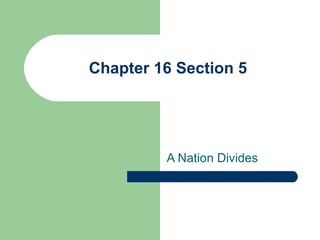
Chapter 16 section 5
- 1. Chapter 16 Section 5 A Nation Divides
- 2. The Election of 1860 The Democrats – Southerners wanted the party to support slavery – Northerners did not want to support slavery – Party splits in two Northern Democrats – Chose Stephen Douglas as their candidate Southern Democrats – Chose John Breckinridge of Kentucky
- 3. The Election of 1860 cont’d The Republicans – Chose Abraham Lincoln for President A new party on the horizon: The Constitutional Union – Tried to heal the split between the North and the South – Chose John Bell of Tennessee
- 4. Americans go to the Polls Americans made their opinions clear Lincoln carried the North and effectively won the election Bell only got a few southern states, and Douglas got most of the South
- 5. The South Reacts Many southerners believed that Lincoln’s election showed that the South no longer had a voice in government. Senator John Crittenden (KY) made one last attempt to save the Union – Extend the Missouri Compromise line to the Pacific – Proposed that states south of the Compromise line could hold slaves.
- 6. The South Reacts cont’d – This bill received little support Many southerners believed that the North had put an abolitionist in the White House They felt that secession was their only choice The first state to secede was South Carolina (12/20/1860) Alabama, Florida, Georgia, Louisiana, Mississippi, and Texas soon followed
- 7. The Confederacy Many southerners believed that the Declaration of Independence supported them – “it is the right of the people to alter or abolish” a government that denies the rights of its citizens They felt that Lincoln had denied them the right to hold slaves
- 8. The Civil War Begins In his inaugural address, Lincoln warned that “no state…can lawfully get out of the Union.” Jefferson Davis began to order forces to begin seizing federal forts in the South Fort Sumter (SC) was one of the only forts not taken over by the Confederacy Fort Sumter, 1861
- 9. The Civil War Begins cont’d President Lincoln learned that supplies at Fort Sumter were running low Lincoln notified the S. Carolina government that he was going to only send food, not troops or weapons On April 11, 1861, the Confederates demanded that Fort Sumter surrender
- 10. This Means War! Major Robert Anderson, the Union commander, refused to give in Confederate guns opened fire Union troops quickly ran out of ammunition On April 13, Anderson surrendered the fort.